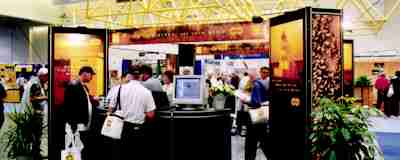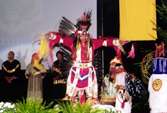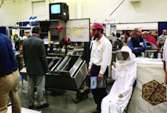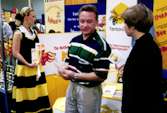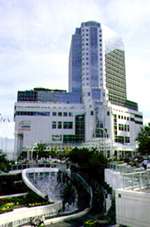|
A wide range of
topics was addressed at the congress,
including the future of the beekeeping industry and the potential for
apitherapy in health maintenance.
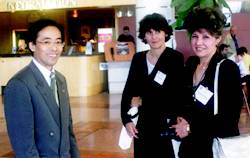
|
Mr.
Yamada meets up with Christina Mateescu (on right), a researcher
from Romania with whom Mr. Yamada has conducted joint research.. |
|
Upon entering the convention center, visitors immediately sensed that the world is truly a mosaic of cultures. More than 4,000 people from 60 countries conversed in a multitude of languages, meeting up with old friends and making new ones. I was able to catch up with Christina Mateescu, head researcher at the National Medical Center of Apitherapy, Bucharest, Romania, where I had visited last summer and a year before that.
The 1999 congress offered a wide variety of programs and more than 200 presenters. It would have been impossible to attend everything, so I selected the lectures of greatest interest to me and arranged my schedule in that way.
On Monday, September 13, I attended a plenary session sponsored by the American Association of Professional Apiculturists titled "Thinking outside the box: Strategies for surviving in the 21st century honeybee business." This session examined sales strategies for the 21st century; the promise of honey for consumers, foods, and health; effective advertising; and other topics related to the sale of honeybee products. On Tuesday, I attended a plenary session titled "The Scientific Basis of Apitherapy", with the keynote presentation by Roch Domerego, vice chairman of the Apimondia Apitherapy Council, titled " The Scientific Basis of an Api-pharmacopeia." I also attended a forum at which the latest research findings in apitherapy were presented. Topics included establishing honey as a recognized medicine, progress in bee venom therapy for HIV/AIDS, and apitox (bee venom) therapy for chronic pain. The number of reports of new findings at the leading edge of apitherapy was surprising, and learning that apitherapy is being used to treat AIDS left me with the strong impression that apitherapy has an amazing future.
|




